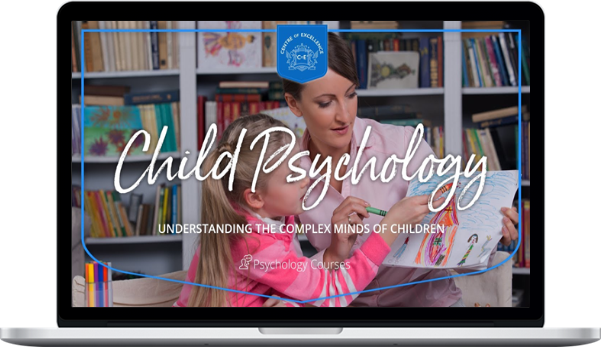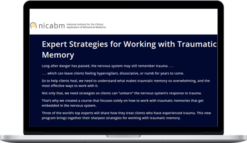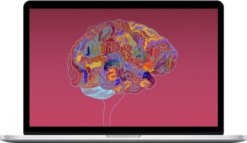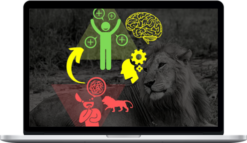Centre of Excellence – Child Psychology Diploma Course
$182.00 $33.00
»Delivery: Within 1 – 7 days
Description
Centre of Excellence – Child Psychology Diploma Course
Description Of Child Psychology Diploma Course
The Child Psychology Course will vastly improve your understanding of the unique and complex minds of children and the effect external and internal influences have on their development. By studying this Child Psychology Diploma Course, you will gain knowledge that can help you to raise well-balanced, productive individuals as well as discover some universal insights into human nature.
This Child Psychology Diploma Course on the psychological development of children looks at the development of very young children. It deals with topics such as the development of perception, knowledge, skills and relationships. The way in which biological, social and cultural influences interact in a child’s development is a central theme, examined from different points of view in modern psychological research and theory.
This distance learning Child Psychology Course is divided into two distinct parts, and the diploma covers some of the major concepts in the field. The first part deals with the physical, social and behavioural development of the child and the influence that family, friends and their environment have in their overall development. The second part deals with understanding the child as an individual. In this you shall study various aspects such as moral development, development of gender roles, aggression in children, behavioural modification, and more.
Child Psychology is the branch of psychology that studies the social and mental development of children. Understanding how children develop can aid in the understanding of how to raise well-balanced, productive individuals as well as provide some universal insights into human nature.
Jean Piaget, a Swiss developmental psychologist and philosopher known for his epistemological studies with children, suggested that children actually think differently than adults. Before Piaget’s work, the common assumption in psychology was that children are merely less competent thinkers than adults. According to Piaget, children are born with a very basic mental structure (genetically inherited and evolved) on which all subsequent learning and knowledge is based. Today, psychologists recognise that child psychology is unique and complex, but many differ in terms of the unique perspective they take when approaching development.
What you’ll learn in Child Psychology Diploma Course
Course Syllabus
What will I learn on the course?
Module 1: Introduction to Child Psychology
- Introduction
- Part 1: The First Year of Life
- Part 2: Infant Reflexes
- Part 3: Social Development in the First Year
- Test Your Knowledge
- Key Learning Points Exercise
- Module 1 Assessment
Module 2: The Formation of Attachments
- Part 1: Formation of Attachments
- Part 2: Animal Studies in Child Development
- Test Your Knowledge
- Key Learning Points Exercise
- Module 2 Assessment
Module 3: Consequences of Breakdowns in Attachments
- Part 1: Consequences of Breakdown in Attachments
- Part 2: Implications of Theories of Attachment
- Test Your Knowledge
- Key Learning Points Exercise
- Module 3 Assessment
Module 4: The Home, Family and School
- Part 1: The Home, Family and School
- Part 2: Effects of Maternal Employment on Children
- Part 3: Families with Absent Fathers
- Test Your Knowledge
- Key Learning Points Exercise
- Module 4 Assessment
Module 5: Basic Principles of Research Methods
- Part 1: Nature and Purpose of Research
- Part 2: Variables, Sampling and Design of Investigations
- Test Your Knowledge
- Key Learning Points Exercise
- Module 5 Assessment
Module 6: The Development of Visual Perception
- Part 1: The Nature/Nurture Debate
- Part 2: Bower – Size Constancy
- Test Your Knowledge
- Key Learning Points Exercise
- Module 6 Assessment
Module 7: The Development of Language and Communication
- Part 1: The Development of Language and Communication
- Part 2: Outline of Language Development
- Test Your Knowledge
- Key Learning Points Exercise
- Module 7 Assessment
Module 8: Intelligence and Intelligence Testing
- Part 1: Definitions of Intelligence
- Part 2: Tests of Intelligence
- Part 3: Advantages and Disadvantages of IQ Testing
- Test Your Knowledge
- Key Learning Points Exercise
- Module 8 Assessment
Module 9: The Nature/Nurture Debate in the Study of Intelligence
- Part 1: Nature/Nurture Debate in the Study of Intelligence
- Part 2: The Stability of IQ
- Test Your Knowledge
- Key Learning Points Exercise
- Module 9 Assessment
Module 10: Data Collection and Interpretation
- Part 1: Data Collection and Interpretation
- Part 2: Data Analysis
- Test Your Knowledge
- Key Learning Points Exercise
- Module 10 Assessment
Module 11: How Children Think
- Part 1: How Children Think
- Part 2: Studies on Egocentrism
- Test Your Knowledge
- Key Learning Points Exercise
- Module 11 Assessment
Module 12: Learning Theory
- Part 1: How Behaviour is Acquired
- Part 2: Learning and Conditioning
- Test Your Knowledge
- Key Learning Points Exercise
- Module 12 Assessment
Module 13: Freud’s Psychodynamic Theory – An Alternative Approach
- Part 1: Freud’s Psychodynamic Theory
- Part 2: The Five Stage Theory
- Test Your Knowledge
- Key Learning Points Exercise
- Module 13 Assessment
Module 14: Moral Development
- Part 1: Moral Development
- Part 2: Investigation of Moral Behaviour
- Test Your Knowledge
- Key Learning Points Exercise
- Module 14 Assessment
Module 15: The Development of Gender Roles
- Part 1: The Development of Gender Roles
- Part 2: Biological, Social and Cultural Theories
- Test Your Knowledge
- Key Learning Points Exercise
- Module 15 Assessment
Module 16: Aggression in Children
- Part 1: Aggression in Children
- Part 2: Psychological Theories and Aggression
- Test Your Knowledge
- Key Learning Points Exercise
- Module 16 Assessment
Module 17: Methods Used in Child Development Research
- Part 1: Methods Used in Child Development Research
- Part 2: Designs for Examining Development
- Test Your Knowledge
- Key Learning Points Exercise
- Module 17 Assessment
Module 18: Play
- Part 1: The Power of Play
- Part 2: The Consequences of Play Deprivation
- Test Your Knowledge
- Key Learning Points Exercise
- Module 18 Assessment
Module 19: Learning in School
- Part 1: Learning in School
- Part 2: Types of Learning
- Test Your Knowledge
- Key Learning Points Exercise
- Module 19 Assessment
Module 20: Behaviour Modification
- Part 1: Behaviour Modification
- Part 2: Behaviour Modification Techniques
- Test Your Knowledge
- Key Learning Points Exercise
- Module 20 Assessment
About Centre of excellence
Here at Centre of Excellence we are supremely proud to be at the heart of a vibrant community of hard-working students. The determination and enthusiasm of our students never ceases to impress us and there is nothing better than seeing our graduates go on to succeed in further education, work, business or just life in general!
More courses from the same author: Centre of excellence
Delivery Policy
When will I receive my course?
You will receive a link to download your course immediately or within 1 to 21 days. It depends on the product you buy, so please read the short description of the product carefully before making a purchase.
How is my course delivered?
We share courses through Google Drive, so once your order is complete, you'll receive an invitation to view the course in your email.
To avoid any delay in delivery, please provide a Google mail and enter your email address correctly in the Checkout Page.
In case you submit a wrong email address, please contact us to resend the course to the correct email.
How do I check status of my order?
Please log in to HealingCourse account then go to Order Page. You will find all your orders includes number, date, status and total price.
If the status is Processing: Your course is being uploaded. Please be patient and wait for us to complete your order. If your order has multiple courses and one of them has not been updated with the download link, the status of the order is also Processing.
If the status is Completed: Your course is ready for immediate download. Click "VIEW" to view details and download the course.
Where can I find my course?
Once your order is complete, a link to download the course will automatically be sent to your email.
You can also get the download link by logging into your HealingCourse account then going to Downloads Page.
Related products
Total sold: 2
Total sold: 2









